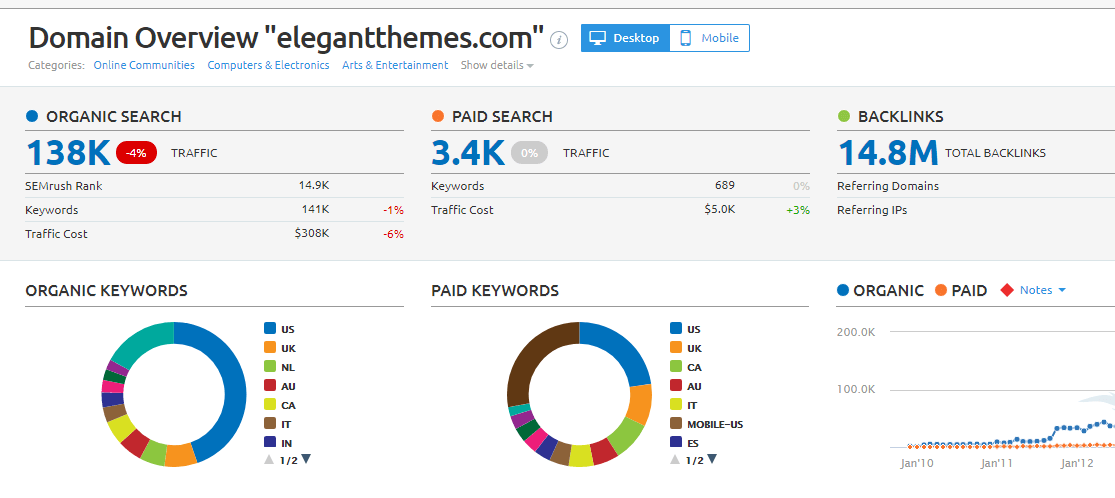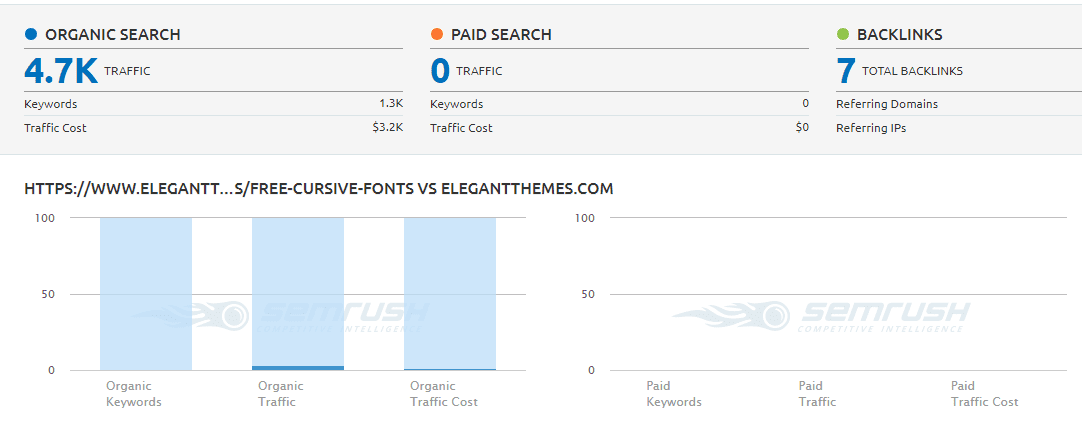Tracking your website’s traffic is relatively straightforward. However, how to check if your WordPress posts are ranking for the right keywords is a different matter. If you don’t monitor your WordPress keywords, you won’t know if your research is paying off.
By monitoring your keyword performance, you’ll know which of your blog posts are pulling in more traffic. In this article, we’re going to talk a bit more about why it’s important to monitor your WordPress keywords. We’ll also cover which tools you can use and what that process looks like.
Let’s get to work!
Why You Should Monitor Ranking for the Right Keywords
If you’re running a WordPress blog, chances are you’re targeting different keywords each post you publish. This is a key aspect of Search Engine Optimization (SEO) and will maximize how your posts appear in Search Engine Result Pages (SERPs), which in turn helps bring more traffic to your site.
You can track your site’s overall performance using analytics tools. These services provide you with a lot of information on visitor behavior, but some of them stumble when it comes to providing you with data about which keywords are pulling traffic to your site.
Moreover, it can be hard to find out if your posts are indeed ranking for the keywords you targeted. If not, it might be time to see if you can tweak them in any way. It can be something as simple as improving the content with more research, changing which keyword you use, or even optimizing your images metadata. When it comes to SEO, every little thing helps.
In the past, we’ve written a lot about keyword research, so you may want to read up on some of those pieces if you’re not sure about these concepts. Once you brush up on the basics, it’s time to talk about the tools you can use to monitor your WordPress keywords.
2 Tools You Can Use to Track Your WordPress Keywords
Most of the more popular WordPress SEO tools – such as Yoast and The SEO Framework – are free. However, when you start looking at third-party SEO services and platforms, you’ll notice a lot of them tend to be rather expensive. That’s because SEO is critical to website growth and a lot of businesses pour a lot of money into making sure they get the best possible results.
The two tools we’re going to talk about below offer free plans you can use for basic keyword research. However, they also provide premium plans, which may be useful for larger sites.
1. SEMrush

SEMrush is an all-in-one SEO tool that helps you find your best keywords. On top of enabling you to research your own sites, you can also investigate how the competition is doing, and find out what other sites are competing for the same keywords.
In addition, SEMrush also provides you with data about ad costs and shows you which announcements are doing better. You can even use it to find information about how many people are paying for ads that show up for specific queries.
Finally, SEMrush shows you information about the domains that are linking back to your site. This lets you study your backlink profile and find out if there’s anything you can do to get better referrals.
Key Features:
Analyze your domain’s top keywords. Find out what terms your competitors are ranking for. Study the ad budgets for specific keywords and find out how many people are competing for each term. Analyze your domain’s backlinks.
Price: Free plan supports up to ten reports | More Information
2. Moz Keyword Explorer

Keyword Explorer is similar to SEMrush when it comes to functionality. It enables you to analyze specific keywords to find out who’s competing with you for them.
On top of giving you information about your rivals, you can also use Moz Keyword Explorer to find alternative keywords. On the other hand, if you use the tool to analyze a domain, it’ll show which keywords you’re ranking for.
Key Features:
Research your competition for a specific keyword. Get estimates on keyword difficulty. Find out what keywords your pages are ranking for.
Price: Free plan supports up to ten monthly searches | More Information
How to Check If Your WordPress Posts Are Ranking for the Right Keywords
We’re now going to see how you can use SEMrush to check your keyword rankings. We’ll be using SEMrush as it’s a user-friendly option that offers more free reports per day. To get started, you’ll need to sign up for a free account, which doesn’t require any payment information.
Once you sign up and log into SEMrush, you’ll be able to use its search functionality to look up specific keywords or domains. For example, let’s take a look at what we get when we input the Elegant Themes domain:

Under the Organic Search section, you can see how much traffic SEMrush calculates for each month and how many keywords the site is ranking for. If you look below that, there’s a section called Organic Keywords, where you can see traffic distribution according to regions.
Now, if you scroll down, you’ll find a list of the top organic keywords the site is ranking for. This list includes their overall position in the SERPs, search volume, and CPC estimates:

That’s all well and good, but you can also use SEMrush to find out which keywords specific posts are ranking for. For example, here’s what we get if we use SEMrush to peek at this article from our archives, focusing on free cursive fonts:

As you can see, all the traffic this article is getting is 100% organic. Now, if you scroll down, you’ll find a list of the top keywords the piece is ranking for. That list includes position, volume, and CPC as before:

For that particular article, we targeted ‘free cursive fonts’ as our main keyword. You can see we’re ranking fifth for that search query, which is quite good. We’re also getting more traffic from ‘cursive fonts’, which is a broader, more competitive term.
With these lists, you can check if your articles are getting traction for the keywords you set out to target, and how much traffic they’re receiving. Keep in mind, though – this works best for posts that have been up for at least a month or two. That way, they’ll get enough traffic for SEMrush to show significant and accurate data. In other words, it’s better to make your way from older articles to newer ones if you set out to monitor your WordPress keywords.
Conclusion
The more content you publish, the more keywords you should be ranking for. However, sometimes you might not see the results you want after a while, and that may be because you’re not targeting the right keywords. By monitoring your keyword performance, you can find out if the options you’re choosing are paying dividends.
There are several tools you can use to monitor your WordPress keywords, such as SEMrush and Moz Keyword Explorer. With the former, all you have to do is enter the URL of whichever page you want to check up, which will tell you what keywords it’s ranking for.
Do you have any questions about how to monitor your WordPress keywords? Let’s talk about them in the comments section below!
Article thumbnail image by gooddesign10 / shutterstock.com
The post How to Check If Your WordPress Posts Are Ranking for the Right Keywords appeared first on Elegant Themes Blog.
Source: How to Check If Your WordPress Posts Are Ranking for the Right Keywords
